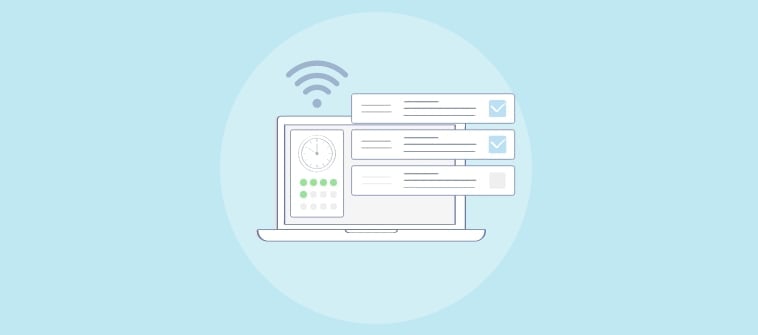$1.6 trillion
As estimated by Accenture, that’s the amount U.S. companies lose every year, entirely because of customer churn driven by poor customer service.
There are several ways to make people fall in love with your brand, from creating a high-quality product or service to conducting savvy marketing campaigns.
But when it comes to the mistakes that can drive away customers, almost nothing beats delivering poor customer service.
One of the best things you can do to avoid high customer churn and the accompanying reputation damage is to build better customer service teams using customer service assessments.
Customer service assessments provide a quick and easy way to analyze the skills and attitudes crucial for customer service roles. Utilizing online assessment tests is an effective strategy for identifying and training skilled customer service professionals to improve the overall customer experience.
In this article, you’ll learn all about customer service assessments, including how to create and optimize them and what skills and attributes to measure using them.
What Is a Customer Service Assessment?
Customer service assessments evaluate a job candidate’s or employee’s skills, knowledge, or temperament concerning their suitability for roles like customer service agents and other related customer support positions.
Online customer service tests consist of a series of questions in various formats, such as multiple-choice, true/false, essay, audio/video response, etc. Depending on the type – scored or personality, such tests may provide a score/percentage or a personality analysis as the outcome.

Why Do Employers Use Customer Service Assessment Tests?
Businesses across various sectors have recognized the pivotal role that exceptional customer service plays in achieving sustained success. Toward this end, companies use customer service assessment tests as a strategic tool in several key areas:
- Hiring Process: By incorporating these assessments into their recruitment strategy, companies can more accurately identify candidates with the requisite skills and temperament for customer service roles.
This method ensures that new hires can contribute positively to the customer experience from day one.
- Employee Development: Customer service assessments are not only about finding the right fit for the job but also about fostering the growth of current employees. Companies use these tests to identify skill gaps in their workforce and tailor training programs to address these deficiencies.
- Performance Evaluation: Regularly administering these assessments helps managers monitor the ongoing development of their team members. By setting benchmarks and tracking progress, companies can recognize outstanding performance and intervene when areas of concern arise, ensuring continuous improvement.
- Team Building: Understanding the strengths and weaknesses of each team member allows leaders to assemble customer service teams with complementary skills. This strategic allocation of resources leads to more efficient problem-solving and a harmonious work environment.
By leveraging customer service assessments in these ways, companies enhance their immediate customer service capabilities and invest in their customers’ long-term satisfaction and loyalty.
What Skills Do Customer Service Agents Need?
Customer service representatives require a blend of technical expertise and interpersonal abilities to meet customer expectations and resolve issues efficiently.
Hard Skills
Essential hard/technical skills required for success in customer service roles include:
1. Industry Knowledge
Whether you’re hiring for an entry-level or advanced position, a customer service representative needs to have a sound knowledge of the customer service industry and understand the importance of social skills in providing top-of-the-line customer service.
2. Product/Service Knowledge
A good customer service experience involves the customer talking to a single customer service representative in a single interaction and leaving satisfied.
Customer service executives can provide quick and effective help only if they thoroughly understand the products or services they’re providing the service for and other related offerings by the company.
In other words, a customer service executive shouldn’t have to refer to manuals and brochures or consult a co-worker to solve customer queries.
Besides product knowledge, customer service agents must also be aware of the policies and regulations of the business. Corporate trainers can use customer service skills assessments to ensure employees fully comprehend all this critical knowledge.
?Pro Tip:
When using customer service assessments as part of a training program, you can add links to your internal knowledge base in the assessment results. This way, you can encourage learners to refresh their product knowledge.
3. Troubleshooting Skills
Customer support professionals need to know how to diagnose a customer’s issue and implement an effective solution to the problem. They must have a good understanding of the various problems that customers may encounter while using the product or service.
They must also know how to ask questions to identify the root cause of a problem.
4. Language Skills
Depending on the region, a customer service representative may need to be proficient in one, two, or even more languages. For example, customer service agents working for US companies may need to be proficient in both English and Spanish.
A customer service skills test should assess job candidates’ proficiency in all language aspects, such as grammar, pronunciation, vocabulary, accent, etc.

5. Computer Literacy
A large part of a customer service agent’s responsibilities involves working on a computer and storing and retrieving information using it. So, every customer service agent in your organization needs to be computer-literate.
They should also be willing to learn to operate new software applications as part of the job.
Many companies don’t realize how important this is until they start losing customers over minor issues that could have been easily resolved if the service reps were properly trained on basic software.
6. Knowledge of Customer Support Tools
A customer care professional may have to employ multiple online tools to offer effective customer support.
For instance, they may need to use live chat software for real-time assistance and help desk software for managing communications across multiple channels.
You can conduct customer care assessment tests to assess and train employees on their knowledge about the usage of such tools.
Watch: How to Provide Delightful Customer Service
7. Typing
For customer service agents, speed is the name of the game. They’ve got to chat or email fast to keep customers smiling and juggle several at once. Plus, they need to talk smart with their team and keep databases up-to-date on the fly.
So, quick fingers and sharp accuracy?
Absolutely non-negotiable for top-notch support!
Soft Skills
When it comes to customer service, soft skills might be even more important than hard skills. Here are the essential soft skills one must have to provide delightful customer service.
1. Communication skills
Communication is the backbone of any customer service operation.
Effective communication skills enable customer service agents to provide speedy resolutions to customer queries and grievances, diffuse tense situations, create better customer relationships, and even cross-sell and up-sell.

2. Active Listening Skills
It’s been more than three decades since the dawn of the internet age. But, phone calls remain customers’ most preferred method for resolving issues.
For phone customer service, listening skills are just as important as speaking skills, if not more. Customer service agents must understand a customer’s query or grievance in the first go so that they don’t waste the customer’s time and their own.
3. Conflict Resolution Skills
No matter how effective your customer service is, conflict can arise, especially when a customer makes an unreasonable request that your company simply can’t entertain.
A customer service agent with excellent conflict resolution skills can guide such customers to a mutually acceptable and beneficial solution.

4. Comprehension Skills
Customer service agents need to quickly understand what customers are saying, even when it’s not directly stated. They should be good at picking up on the real message behind casual or unclear messages. This helps them respond better and meet customers’ needs effectively.
You can easily check candidates’ reading or listening comprehension skills by conducting customer service quizzes that present quiz-takers with a passage or audio clip and ask questions based on it.

5. Email Etiquette
Customer service representatives should understand the fundamentals of email communication to prevent misunderstandings or offending customers. Properly composed emails not only avoid these pitfalls but also serve to positively impact customer relations and support customer retention.

6. Decision-Making Skills
Customer service executives may need to make important decisions, such as:
- whether to entertain the customer’s request
- which tasks to prioritize
- whether to escalate a complicated case to a superior or tackle it themselves
Excellent decision-making abilities in your customer service representatives ensure a smooth-functioning customer service department.
?Pro Tip:
You can assess decision-making skills by including scenario or case study-based questions in your customer service assessment.
7. Empathy & Emotional Intelligence
Excellent customer service professionals can manage their own emotions and the customers’ emotions to come out of sticky situations with innovative solutions. For example, they can retain their confidence and composure even when faced with frustrated customers.
Good customer service also means being able to put oneself in the other person’s shoes to accurately assess the gravity of the situation.
Customer support agents who possess an empathetic mindset can make the customer feel that they are deeply valued by the organization and work together with them to overcome hurdles.
8. Negotiation Skills
Negotiation skills are crucial for customer service representatives, similar to sales roles, as they often negotiate terms of solutions with customers.
For example, let’s say you offer a cloud-based software solution, and one of your customers requests a new feature. The new feature will require extensive customization and development time but won’t provide much value to the customer’s business or your own.
In such a scenario, your customer service executive should be able to use the art of persuasion to convince the customer to go for a different solution without hurting their sentiments.

9. Teamwork Skills
Occasionally, customer service representatives will need to work together with colleagues within their own departments and across other departments. Possessing strong teamwork abilities enables more efficient and productive collaboration, enhancing both the quality and speed of customer service.
10. Time & Stress Management
Customer service representatives can have a LOT of stress-inducing tasks on their plate each day. Stress and time management skills enable them to handle pressure effectively to deliver consistently delightful service.
11. Patience
Customer service executives may need to deal with multiple angry customers daily. They may also need to provide detailed explanations for seemingly straightforward queries to ensure that the customer leaves the interaction happy and satisfied. All of this requires a lot of patience on their part.
12. Cognitive Skills
Customer service representatives face tricky situations every day requiring cognitive abilities, such as:
- Logical reasoning
- Critical thinking
- Attention to detail
- Multitasking ability
A customer service representative with excellent cognitive abilities can process and recall information quickly. This enables them to resolve grievances efficiently and easily familiarize themselves with new information related to the company’s products and services.
13. Confidence & Sense of Humor
To succeed in customer service, representatives should be confident, have a vibrant personality, and a good sense of humor. These qualities improve conversations with customers, contribute to a positive team atmosphere, and empower representatives to address and solve customer issues efficiently.
Best Ways to Assess Customer Service Skills
Effective assessment of customer service skills requires a combination of methods that measure both technical knowledge and practical application.
Here are the top ones:
1. Quizzes
Quizzes are an effective tool for evaluating customer service skills throughout the employee lifecycle, from hiring to ongoing development. They offer a structured way to measure both theoretical knowledge and practical abilities, making them a key part of a comprehensive assessment strategy.
Quizzes can assess crucial customer service competencies, including communication skills, problem-solving abilities, product knowledge, and the ability to handle real-world scenarios. For instance, they can test understanding of communication techniques, evaluate responses to customer issues, and gauge empathy and cultural sensitivity.
Additionally, quizzes help identify knowledge gaps that can be addressed through targeted training.
Related Read: What Is a Training Needs Assessment (TNA) & How to Conduct It
Using online quiz maker software simplifies the creation, administration, and scoring of quizzes. These platforms allow for automation, instant feedback, and easy integration into training systems, making them particularly useful for remote teams.
By incorporating online quizzes into your assessment strategy, you can gain deeper insights into your team’s strengths and areas for improvement. This approach enhances the efficiency, engagement, and scalability of customer service hiring and training efforts.
Watch: How to Create a Quiz: Step-by-Step Tutorial
Best practices for customer service quizzes:
- Cover essential skills like communication, empathy, and problem-solving.
- Use real-life scenarios for practical assessment.
- Balance theoretical and application-based questions.
- Provide detailed feedback to enhance learning.
- Integrate quiz results into ongoing training programs.
2. Personality Assessments
Using personality assessments during your hiring or onboarding process can be a great way to ensure that new customer service employees fit in seamlessly with their team and role.
For example, you can use a conflict management style assessment, as shown below, to find an employee’s preferred way of dealing with conflicts.
Corporate trainers can use the insights from such an assessment to train employees on conflict resolution skills. Meanwhile, managers who know their team members’ conflict styles can use the knowledge to personalize and enhance their leadership.
Similarly, you can conduct a pre-employment personality test to find out if a candidate has the required personality traits needed to thrive in the customer service industry and in the role they’re being considered for.

Here are the personality traits you should look for in customer service representatives:
- Conscientiousness
- Optimism
- Intrinsic motivation
- Adaptability
- Emotional intelligence
- Friendly attitude
- Humility
- Patience
- Curiosity
| ❗Important While personality assessments can be invaluable for matching customer service candidates with the role and company culture, you must ensure that your personality tests are role-relevant and consistent with a business necessity. Avoid using personality assessments for screening or as the only hiring criterion. Instead, use them to complement your skill evaluations and interviews. |
3. Interviews
Interviews are a classic method for assessing customer service skills, offering direct interaction to gauge a candidate’s communication style, problem-solving abilities, and cultural fit.
Traditional face-to-face interviews allow interviewers to ask specific questions and observe candidates’ responses in real time, providing valuable insights into their suitability for the role. However, with the rise of remote work and global hiring, video interviews have become an increasingly popular alternative.
Video interviews offer the same direct interaction as in-person interviews but with added flexibility. They allow you to evaluate candidates regardless of their location, making it easier to hire customer service employees from different time zones without the hassle of scheduling in-person meetings.
Building on this, online quiz tools now enable the integration of video interview quizzes into the assessment process. These quizzes allow candidates to respond to interview questions by recording or uploading videos or audio clips at their convenience.
Watch: How to Create a Video Interview Quiz
The unique advantage of video interview quizzes is that they remove scheduling conflicts while offering a consistent and standardized evaluation. By letting candidates complete the assessment on their own time, you capture more authentic responses and get a more accurate reflection of their skills and communication style.
Additionally, video interview quizzes are valuable for corporate trainers, offering a new way to assess and enhance customer service skills in an engaging and interactive format.
4. Realistic Job Preview
In this assessment method, you provide the candidate with a look at a typical day on the job. The candidates who don’t like what they see or don’t think they are up to the task will screen themselves out of the race.
You can provide a job preview in multiple ways, such as
- Sharing job preview videos or video testimonials featuring the employees and managers.
- Conducting a situational judgment test
- VR simulation
- Job shadowing
?♂️Pro Tip:
You can enhance your customer service quizzes by incorporating job preview videos and employee testimonials. Allowing candidates to view these videos before or after taking the test can offer them a clearer understanding of the role and the company culture, ultimately attracting better-suited applicants and enriching the selection process.
5. Peer Interview
A peer interview is just like a regular face-to-face interview. The only difference is that, in a peer interview, the interviewer is a potential team member in a similar role instead of a recruiter or team leader. Conducting peer interviews as a customer service assessment offers many benefits, such as:
- Better, more relevant questions asked in the interview
- Candidates get a proper idea of what the job will be like
- Candidates feel at ease so that they can better express themselves
- Helps decide role and culture-fit
6. Job Trial
A one-day trial can be a good way to find out if the candidate will be able to do the job. For the trial day, you can provide the candidate with previously solved tickets to work on. This will give you a fair idea of their ability to do the job effectively as well as their working style.
7. Reference Check
If you ask the right questions, reference checks can provide deep insights into how a candidate works and how they deal with customers. For example, you can ask questions such as:
- How long did Mr. XYZ work for you?
- What were their key responsibility areas?
- What were some of their strengths and weaknesses?
- Why did Mr. XYZ leave your company?
So, that was a look at the various methods of customer service assessment and the customer service skills you need to evaluate using them. Now, let’s find out how you can make your assessments using online assessment software.
FREE. All Features. FOREVER!
Try our Forever FREE account with all premium features!
How to Conduct a Customer Service Assessment
Conducting a customer service assessment involves a structured approach to ensure that it effectively evaluates the necessary skills and attributes. Here’s how to go about it:
- Define Objectives
Begin by clearly defining what you hope to achieve with the assessment. Are you looking to hire new staff, identify training needs, or evaluate current performance? Your objectives will guide the structure and content of your assessment.
- Choose the Right Tools
Select assessment software that offers the flexibility and features you need, such as question variety (e.g., multiple-choice, essay, video response), customizability, and analytics for in-depth evaluation.
Watch: How to Choose the Best Assessment Software
- Develop Assessment Content
Based on your objectives, create quizzes and other assessment materials that accurately measure the relevant skills and knowledge. Include a mix of hard skill, soft skill, and psychometric assessments to get a comprehensive view of each candidate’s capabilities.
- Administer the Assessment
Ensure a smooth process for candidates or employees taking the test. Provide clear instructions and support for any technical issues. Consider the timing of the assessment to minimize disruption and ensure maximum participation.
- Analyze Results
Utilize the analytics tools provided by your assessment platform to review the results. Look for patterns that indicate strengths and weaknesses in individual or team performance.
Watch: How to Review Quiz Reports & Statistics
- Take Action
Based on the assessment outcomes, make informed decisions regarding hiring, training, and team composition. Develop targeted training programs to address identified skill gaps and reinforce areas of strength.
- Review & Iterate
The customer service landscape is constantly evolving, so it’s important to regularly review and update your assessment strategy. This ensures it remains relevant and continues to meet your company’s changing needs.
By following these steps, you can conduct effective customer service assessments that not only identify the best talent for your organization but also foster a culture of continuous improvement and excellence in customer service.
Steps to Create an Online Quiz for Customer Service Assessment
Let’s quickly look at the process for creating online customer service assessment quizzes.
Step 1: Choose assessment type – scored or personality

Step 2: Pick a pre-built assessment or create it from scratch, either manually or using AI

Step 3: Add custom questions or select them from the library

Step 4: Customize the look and settings
Step 5: Share with the candidate or learner
For personality assessments: If you’re creating a personality assessment, you’ll also need to map answer options with personalities, as shown in the image below.

Also, if you’re conducting a customer service assessment for training, you can consider setting up automated certification to motivate and engage learners.
Watch: How to Issue Custom Quiz Certificates Featuring Your Branding
Now that you know how to create customer service assessments online, let’s look at some tips to optimize them for effectiveness.
Tips to Create Effective Customer Service Assessments
Using the best practices listed below, you can ensure that you conduct professional and insightful customer service assessments for hiring or training.
- Create Visual & Engaging Tests
Adding images and videos to an assessment quiz instantly makes it more engaging. Improving the engagement factor of your assessments is especially useful when you’re using them to reinforce knowledge imparted in training.
Check out this customer service assessment test example to know what we mean:

Besides adding visual elements, there’s another powerful way to make your assessments more engaging.
Instead of having only multiple-choice or true/false questions in your assessment, you can use a mix of various interactive question types.
Watch: 15+ Question Types for Online Learning & Assessment
For example, you can use the order list question type to ask questions on task prioritization. Assessment-takers can respond by dragging and dropping items to form the correct priority sequence.
? Pro Tip:
Another interesting way of asking questions is by adding a video, comprehension passage, or document and asking questions based on them.
- Include Situational Judgment Questions
Situational judgment questions are essential for recruitment assessments. They provide a good way to predict how a candidate will react in specific situations when on the job.
On the other hand, corporate trainers can use a customer service situations assessment to check whether an employee understands the company’s priorities or not.
?Pro Tip:
You can add images to your situational judgment questions to make it easier for assessment takers to visualize the situations.
- Include Audio/Video Response Questions
Audio/video response questions provide an excellent way to assess several key customer service skills, such as:
- Communication skills
- Language proficiency
- Empathy
- Confidence
Audio/video response questions also let you engagingly ask open-ended questions and conduct remote interviews. For example, you can ask questions such as “How do you deal with a difficult customer?”
The assessment taker can answer the question by recording a video. In doing so, they can show you exactly how they talk with difficult or frustrated customers.
- Configure Security & Anti-Cheating Settings
To ensure the credibility and integrity of your assessments for customer service, you’ll need to configure certain quiz settings. You can:
- Enable remote proctoring to prevent remote assessment takers from getting outside help.
- Disable tab and browser switching to prevent assessment takers from looking up answers online.
- Disable copying and printing of assessment content.
- Randomize the order of questions and answer options.
- Prevent unauthorized access by adding password protection and creating secure, individualized logins for assessment takers.
? Pro Tip:
In addition to configuring the above settings, you can also create a question bank so that each assessment taker gets a different, random set of questions from the question bank.
- Set Time Limits
Adding time limits to assessments is a great way to make them more challenging and ensure that candidates and employees have knowledge about key concepts at their fingertips.
Additionally, adding time limits also serves as a cheating-prevention measure. With time limits in place, assessment takers only get enough time to complete their assessments and not enough time to use unfair means to find the answers.
You can set an overall time limit for the assessment or individual time limits for each question.
Watch: How to Create a Timed Assessment
- Ask Focused Questions in Interviews
As mentioned above, video interviews work amazingly well for remote hiring. But that is only true if you ask the right questions. Asking only generic questions, such as “What are your strengths and weaknesses?” won’t be very helpful when conducting a customer service assessment.
You need to ask questions to help uncover how the candidate deals with customers.
For example, you can ask questions such as:
- How do you handle irate customers?
- How do you stay motivated when facing multiple angry customers in a single day?
- Have you ever helped a customer by bending the company rules?
- Work on the Look & Feel
A good-looking assessment creates a positive first impression on potential employees. You can add a theme to your assessment that fits well with your company colors. You can also include your company logo and graphics in the theme and add an attractive cover image.
- Use Top-Notch Assessment Software
Good assessment software make the entire process of creating and sharing assessments seamless. For example, using an excellent assessment tool, you can:
- Get started quickly with pre-built customer service assessments
- Create new assessments easily using the tool’s question bank
- Ensure cheating-free assessments with browser security, shuffling, question pooling, etc.
- Hire across time zones by conducting flexible video interviews
- Motivate learners with custom certificates
- Accurately analyze performance and progress with in-depth reports and analytics
- Design engaging assessments by adding images & videos, multiple styles of questions, themes, etc.
Customer Service Assessment Test Questions
Creating an effective customer service assessment requires carefully crafted questions that evaluate both the hard and soft skills essential for the role. Here are some sample questions you can include in your assessment tests to ensure comprehensive evaluation:
Hard Skills Questions:
- Product/Service Knowledge:
A customer is confused about the features of our latest product. How would you explain its benefits in a simple and clear way?
- Troubleshooting Skills:
A customer reports that a feature of our service isn’t working as expected. What steps would you take to diagnose and resolve the issue?
- Language Skills:
How would you handle a situation where a non-native speaker struggles to communicate their issue? Provide a sample response in a second language if applicable.
- Knowledge of Customer Support Tools:
Describe how you would use live chat software to assist multiple customers simultaneously while maintaining a high level of service.
Soft Skills Questions:
- Communication Skills:
A frustrated customer calls in, demanding a solution to a problem they’ve encountered. How would you handle the conversation to both resolve the issue and maintain a positive relationship?
- Active Listening Skills:
After listening to a customer describe their problem, summarize their issue in your own words and outline the next steps you would take to assist them.
- Conflict Resolution Skills:
A customer is upset because their request for a refund has been denied. How would you de-escalate the situation and find a mutually acceptable solution?
- Empathy & Emotional Intelligence:
A customer expresses frustration with a long wait time. How would you show empathy and turn their experience into a positive one?
Situational Judgment Questions:
- A customer asks for a service that goes against company policy. How would you respond while maintaining a good relationship with the customer?
- You receive multiple customer inquiries at once. How would you prioritize and manage these requests to ensure timely and effective responses?
Decision-Making Questions:
- You have the authority to offer a discount to a dissatisfied customer. What factors would you consider before making this decision, and how would you communicate it?
- If you encounter a problem that you can’t solve on your own, how would you decide whether to escalate it to a supervisor or handle it yourself?
FREE. All Features. FOREVER!
Try our Forever FREE account with all premium features!
Build a Competent Customer Service Team
We know that creating a five-star customer service team isn’t easy, but the good news is that it isn’t impossible.
Hiring and training highly skilled consumer-facing employees becomes much more streamlined and cost-effective when you incorporate technology such as online assessment software into your recruitment, onboarding, and training processes.
ProProfs Quiz Maker is the simplest and most feature-rich assessment tool for conducting customer service assessments. It comes equipped with an advanced AI quiz generator, pre-built skill tests, and over a million ready-to-use questions.
The quiz-making tool also lets you customize and secure your assessments using 100+ smart settings and offers a delightful reporting system to analyze performance and progress.
Frequently Asked Questions
What are the different types of customer service assessments?
Customer service assessments can take multiple forms depending on the skills and attributes being evaluated. Some common types include:
- Skill-Based Assessments – Evaluate technical skills like troubleshooting, product knowledge, and computer literacy.
- Personality Tests – Assess traits like empathy, patience, and teamwork to determine a candidate’s suitability for customer service roles.
- Situational Judgment Tests (SJTs) – Present real-life scenarios to assess decision-making and problem-solving skills.
- Communication Assessments – Test verbal and written communication, including grammar, tone, and clarity.
Role-Playing Exercises – Simulate customer interactions to observe a candidate’s ability to handle customer queries.
How often should I conduct customer service assessments?
The frequency of customer service assessments depends on your company’s goals and needs. Here’s a general guideline:
- Pre-Employment – Conduct assessments during the hiring process to ensure candidates meet required skill levels.
- Onboarding & Training – Assess new hires within the first 30-60 days to measure their progress.
- Quarterly Evaluations – Regular assessments help track ongoing employee development and identify areas for improvement.
- Annual Performance Reviews – Incorporate skill and personality assessments into yearly performance evaluations.
After Major Changes – If new policies, products, or customer service technologies are introduced, assessments should be conducted to ensure employees are up to date.


 We'd love your feedback!
We'd love your feedback! Thanks for your feedback!
Thanks for your feedback!







